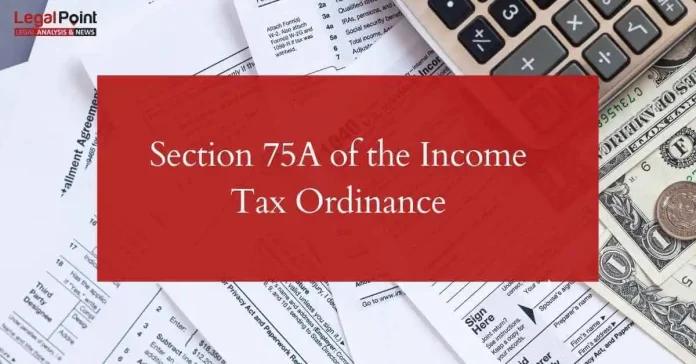Tax evasion is a big issue in Pakistan. Many people do not know about tax laws, which can either save them money or cause financial trouble.
One important rule to understand is Section 75A of the Income Tax Ordinance.
This law applies to asset purchases and requires people to use banking channels for certain transactions. Knowing about this law can help avoid tax issues and penalties.
Table of Contents
What is Section 75A?
Section 75A was introduced to make financial transactions more transparent, reduce tax evasion, and stop illegal money transfers.
This law requires people to buy high-value assets through banking channels instead of using cash. If they don’t follow this rule, they can face penalties and lose tax benefits.
This section’s main aim is to ensure that big transactions are recorded in bank statements. This helps the government track asset purchases and ensures that people report the correct value of their assets for tax purposes.
Who Needs to Follow Section 75A?
This law applies to those who buy land, buildings, machinery, or other valuable items.
Here’s when it applies:
- If the asset is an immovable property (land or building) worth PKR 5 million or more.
- If the asset is machinery or any other item worth PKR 1 million or more.
The value of these assets is determined based on Federal Board of Revenue (FBR) rates or Deputy Commissioner (DC) rates.
Even if you buy an asset at a lower price, the tax authorities will still consider these official rates.
How to Make Payments Under Section 75A?
To follow this rule, buyers must use banking methods to make payments. Accepted payment methods include:
- Bank transfers (online or through bank branches)
- Pay orders
- Crossed cheques (which cannot be cashed directly)
For example, if you are buying machinery worth PKR 1.2 million, you must pay through a bank. If you pay in cash, you may face penalties and lose tax benefits.
What Happens If You Don’t Follow Section 75A?
Not following this rule can cause several problems. The biggest issue is that you cannot claim tax benefits on assets bought without using banking channels.
Consequences of Non-Compliance:
- If you buy an asset in cash, you cannot claim tax deductions for its depreciation.
- When you sell the asset, the tax authorities may consider your purchase price as zero, leading to higher tax payments.
For example, if you buy a property for PKR 5 million but don’t use a bank transfer, the tax authorities may ignore your purchase price.
If you sell it for PKR 7 million, your taxable gain will be PKR 7 million instead of PKR 2 million, increasing your tax liability.
Penalties for Breaking This Rule
If you do not follow Section 75A, you can be fined under Section 182 of the Income Tax Ordinance. The penalty is 5% of the asset’s fair market value.
For example, if you buy an asset worth PKR 5 million without using banking channels, the penalty could be PKR 250,000. This is separate from any additional tax you may owe.
Why Following Section 75A is Important?
This law benefits both the government and taxpayers. It ensures that financial transactions are clear and recorded, prevents tax evasion, and helps businesses and individuals avoid tax penalties.
To stay compliant:
- Always check if your purchase falls under Section 75A’s limits.
- Make sure to use banking methods for payments.
- Keep proper records of transactions to avoid tax disputes.
- If unsure, consult a tax expert for guidance.
Conclusion
Understanding and following Section 75A of the Income Tax Ordinance is essential for anyone buying high-value assets.
Using banking channels for payments helps you stay compliant with tax laws, avoid penalties, and claim tax benefits.
If you are unsure about the process, seeking professional tax advice can help prevent financial and legal issues.
Always use legal payment methods and keep records to ensure a smooth transaction.



